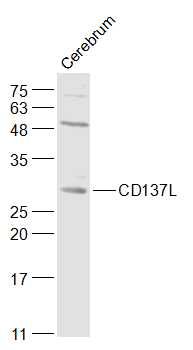产品货号 : mlR3851
英文名称 : TNFSF9/CD137L
中文名称 : 肿瘤坏死因子配体超家族成员9抗体
别 名 : 4 1BB L; 4 1BB ligand; 4 1BBL; Cd137l; Cd157l; homolog of mouse 4 1BB L; homolog of mouse 4 1BBL; ILA ligand (TNF related); Ly63l; receptor 4 1BB ligand; Tumor necrosis factor (ligand) superfamily member 9; TNFL9_HUMAN.
研究领域 : 肿瘤 细胞生物 免疫学 神经生物学 细胞表面分子 t-淋巴细胞
抗体来源 : Rabbit
克隆类型 : Polyclonal
交叉反应 : Human, Mouse, Rat,
产品应用 : WB=1:500-2000 ELISA=1:500-1000 IHC-P=1:400-800 IHC-F=1:400-800 ICC=1:100-500 IF=1:100-500 (石蜡切片需做抗原修复)
not yet tested in other applications.
optimal dilutions/concentrations should be determined by the end user.
分 子 量 : 25-27kDa
细胞定位 : 细胞膜
性 状 : Lyophilized or Liquid
浓 度 : 1mg/ml
免 疫 原 : KLH conjugated synthetic peptide derived from human TNFSF9:101-200/254 <Extracellular>
亚 型 : IgG
纯化方法 : affinity purified by Protein A
储 存 液 : 0.01M TBS(pH7.4) with 1% BSA, 0.03% Proclin300 and 50% Glycerol.
保存条件 : Store at -20 °C for one year. Avoid repeated freeze/thaw cycles. The lyophilized antibody is stable at room temperature for at least one month and for greater than a year when kept at -20°C. When reconstituted in sterile pH 7.4 0.01M PBS or diluent of antibody the antibody is stable for at least two weeks at 2-4 °C.
PubMed : PubMed
产品介绍background:
This cytokine belongs to the tumour necrosis factor (TNF) ligand family. It is a ligand for TNFRSF9, which is a costimulatory molecule in T lymphocytes. This cytokine and its receptor are involved in the antigen presentation process, and in the generation of cytotoxic T cells. This cytokine is also shown to be required for the optimal CD8 responses in CD8 T cells. This cytokine is found to be expressed in various carcinoma cell lines, and is thought to be involved in T cell-tumour cell interaction.
Function:
Cytokine that binds to TNFRSF9. Induces the proliferation of activated peripheral blood T-cells. May have a role in activation-induced cell death (AICD). May play a role in cognate interactions between T-cells and B-cells/macrophages.
Subunit:
Homotrimer.
Subcellular Location:
Membrane; Single-pass type II membrane protein.
Tissue Specificity:
Expressed in brain, placenta, lung, skeletal muscle and kidney.
Similarity:
Belongs to the tumor necrosis factor family.
SWISS:
P41273
Gene ID:
8744
Important Note:
This product as supplied is intended for research use only, not for use in human, therapeutic or diagnostic applications.
产品图片












